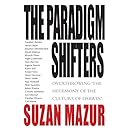Major scientists from a dozen countries present evidence that a paradigm shift is underway or has already taken place, replacing neo-Darwinism (the standard model of evolution based on natural selection following the accumulation of random genetic mutations) with a vastly richer evolutionary synthesis than previously thought possible. About The Author Suzan Mazur is the author of two previous books, The Altenberg 16: An Exposé of the Evolution Industry and The Origin of Life Circus: A How To Make Life Extravaganza. Her reports have appeared in the Financial Times, The Economist, Forbes, Newsday, Philadelphia Inquirer, Archaeology, Astrobiology, Connoisseur, Omni, Huffington Post, Progressive Review, CounterPunch, Scoop Media and other publications, as well as on PBS, CBC and MBC. She has been a guest on Charlie Rose, McLaughlin and various Fox Television News programs.
Also from Barnes & Noble, Ingram Books, Baker and Taylor et al.

Follow UD News at Twitter!
